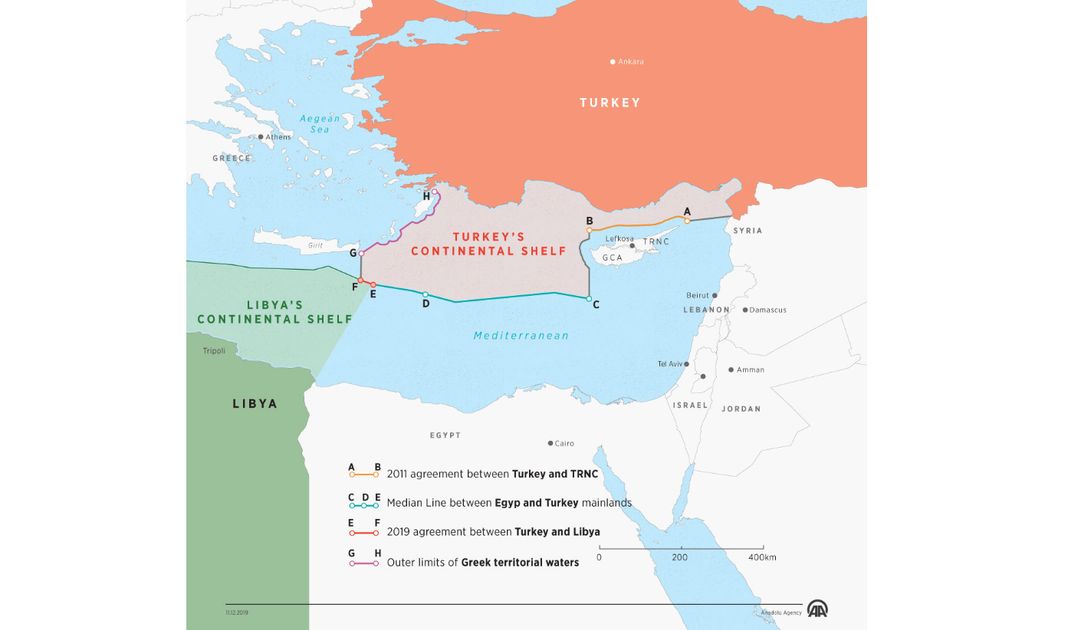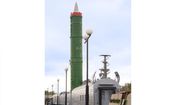Turkish Middle Eastern Strategy: Geopolitical Implications for Libya and Eastern Mediterranean

(Photo: www.aa.com.tr)
Russia revealed itself as a crucial regional player right after 2014. Iran has been playing an independent role since 1979, that totally contradicts the Western agenda and now in the region there is raising a new independent player, which is Turkey. Turkey as a former great power had always a special status and never allowed to downgrade itself to the countries of lower categories. The best example of such behavior, were years between 1963-1974, when the Cyprus issue has erupted. The misbehavior of Turkey since 1963 when Ankara threatened to use force against the Greeks triggered the White House to emotional moves as Trump recently did, when he wrote a humiliating letter to the President Recep Erdogan. Lyndon Johnson wrote an aggressive letter to the Turkish Premier, Ismet Inonu. In the letter, Johnson threatened Turks that in case of USSR intervention to the war, “NATO could not assist to Turkey” and that U.S. will not allow to use the weapons located in Turkish territory for self-defense. It was a shocking event in Turkey and was a triggering factor for improving Turkish-Soviet relations. As a result of landing Turkish troops in Cyprus in 1974 the U.S. introduced an arms embargo on Turkey.
Historically speaking, Turkey is a difficult partner of the West, but it always remained a member of NATO. All Soviet (often kind) diplomatic inquiries as to whether or not Turkey was ready to return to the Ataturk principles of foreign policy of neutrality, were always answered by Ankara that she was committed to NATO and the U.S. and her major allies. Nevertheless, without balancing between the Soviet Union and the U.S. it would be impossible for her to relatively easily change the geopolitical situation in Cyprus without undermining her status as “a staunch ally” of the West in the Middle East. The Soviet factor was a serious geopolitical advantage for Ankara and allowed her to secure national interests in Eastern Mediterranean, especially in Cyprus. Interestingly, the Russian factor as a Soviet factor during the Cold War played the greatest role in the contemporary foreign policy strategy of Turkey. However, between the Cold War and current rising the Multipolar world order, Turkish ‘misbehavior’ can have devastating consequences to Western positions in the Middle East and even for the entire Eurasia.
Turkey is a regional game changer and this is undeniable, but since Turkey announced her decision to intervene directly into a conflict beyond her national frontier, she has become a geopolitical gambler. From the very beginning of the Libyan crisis, after the Arab Revolutions, Turkey (together with Qatar and Italy) is supporting the General National Congress (GNC) under the leadership of Fayez al-Sarraj against the General Khalifa Haftar Libyan Liberation Army (LLA). Khaftar backed by Egypt, U.A.E and partially by Russia. Already in April, 2019 when it became clear that the GNC is going to collapse without the external threat, Erdogan told Sarraj that Turkey “will spare no effort in confronting the conspiracy against the Libyan people.” In November 2019, Turkey provided the GNC with own Bayraktar-TB2 drones. Turkey became recently one of the most advanced countries according to the level of development of armed drones. By this move Ankara created from Libya a battlefield of armed drones. The drones to the LLA were provided by the U.A.E. that bought them from China. If we assume that Haftar is planning to siege the city of Tripoli, the war of lethal drones will intensify in the urban areas. In the same period, there were reports that the GNC has received targeting armored vehicles delivered from Turkey and a munitions depot. According to the UN in 2019 Jordan, Turkey and the United Arab Emirates have systematically violated the Libyan arms embargo. On November 27, Ankara and Tripoli’s GNA signed two separate agreements, one on military cooperation and the other on maritime boundaries of countries in the Eastern Mediterranean. Athens in response stopped diplomatic relations with Libya.
On January 2, 2020 the Turkish Parliament adopted a motion in favor of sending troops to Libya. Erdogan in a couple of hours discussed this issue with Donald Trump who pointed out that foreign intervention is “complicating the situation in Libya.” The officials from the Russian Federation stated that they were concerned how things were developing and they call for diplomatic solution to the ongoing civil war. Erdogan’s decision to send troops complicated the Turkish position in the Arab Muslim world, for instance the Arab League. Additionally, the Secretary General of the organization has stated that “Military interventions of non-Arab countries against Arab lands are rejected by all Arab states.” Actually the same reaction of the Arab League was on the conducting by Turkey military operation in October 2019, they called it the “invasion of an Arab state.”
In order to grasp the nature of the current international situation for Turkey, let us draw attention to the chain of events that created an unprecedented geopolitical knot for the Middle East. If before, during the Cold War, the major players definitely were traditional European powers like France and Britain, after the USSR and the U.S.A., now Russia is only one of the players and has neither the status nor the strength of a superpower. The three traditional major powers of the West are totally retreating from any military commitments in the Middle East and they found themselves under a grave burden of domestic difficulties, as it is uncertain when they are going to end.
EastMed and Cyprus. The rivalry for the enormous gas resources that were revealed in 2011 in the Eastern Mediterranean zone, was postponed because of the Arab Spring and the civil wars in Syria and Libya. As soon as the situation has stabilized, the Mediterranean countries initiated a process of negotiations for building of the future of the EastMed pipeline to Europe from Israel, Cyprus, and Greece to Italy. The participation of Cyprus reanimated the Northern Cyprus issue. Neither Greece nor Cyprus recognize the Turkish and TRNC exploration of hydrocarbon resources and drilling activities in the Eastern Mediterranean and considered these activities as illegal. Escalation is taking shape for instance, four F-16 fighter aircraft and a C-130 military transport aircraft belonging to the Greek Air Force were sent to the Paphos Air Base in Southern Cyprus. Turkey immediately responded by dispatching from Ankara six fully loaded F-16s with their combat systems activated. The fighter jets flew over the Green Line in Cyprus and made consecutive landings at the Gecitkale Airport (Northern Cyprus). The struggle for continental shelf and exclusive economic zone in Eastern Mediterranean is taking a dramatic shape.
It should be noted that at the same day when Turkish Parliament approaved sending of Turkish troops to Libya in Athens, Greece was held the Seventh Trilateral Summit between PM Netanyahu, Greek PM Kyriakos Mitsotakis and Cypriot Pres. Nicos Anastasiades. They signed the agreement for the EastMed gas pipeline that will run from Israel through Cyprus and Greece to Europe. Thus, Israel is becoming gas exporter country. However, the biggest concern of Israel is actually Turkey that will play the role of “spoiler” against this pipeline according to Israelis. The major global players are divided over the EastMed pipeline. For example, the U.S. together with Greece, Israel and Cyprus issued the Joint Declaration after the 6th Trilateral Summit in March 2019. Neither Turkey nor Russia happy about this project and here they have common interests. Interesting that both Russia and Turkey are ready to propose to Israel the idea of building pipeline through Levant to Turkey. On January 4, President of Cyprus Nicos Anastasiades stressed that “It is beyond obvious that Turkey is attempting in a dynamic manner to exercise its expansionary policy in the wider Mediterranean region, which is especially dangerous.” Generally speaking Turkish strategy is cut the line between Cyprus and Crete and actually the agreement with Libya is claiming to Ankara her rights on this maritime economic zone.
Anti-Turkish Saudi-U.A.E. Axis. The deployment of the Saudi Arabian troops to protect the Saudi and Egyptian Aramco specialists to Northern Syria (Deir Ez-Zor) was regarded as a hostile act in Turkey. Ankara considers that there exists the Saudi-U.A.E. axis against Turkey and the events in the Eastern Mediterranean: gas explorations by Turkey; deployment of troops to Libya and the Turkey-Libya Maritime Boundary Delimitation Agreement. Plus, Turkey has announced its readiness to cooperate with Israel and Egypt through the constructing alternative pipeline to deliver gas from Egypt and Israel to Europe. The Eastern Mediterranean Gas Forum considered in Ankara as hostile to Turkey, actually, is seen by Moscow in the same way. Thus, Saudi-U.A.E. and Egypt actions aim to create a band in northern Syria that would isolate Turkey from the Arab/Muslim world and the transportation project planning to transfer Middle Eastern resources to Europe through a route excluding Turkey. The recent agreements and initiatives of Turkey such as the agreement on the Idlib demilitarization zone, operations of Olive Branch, Euphrates Shield and Peace Spring targeting exactly this ‘isolation band.’ The Saudi Arabia support of Haftar is a part of this strategy whose goal is to undermine Turkey. Officially Turkey is calling for a dialogue.
Idlib. The situation in the Idlib de-escalation zone is taking a new phase. The Astana and Sochi processes managed to settle many difficulties between Teheran, Moscow and Ankara. However, the only ‘bleeding wound’ left in Syria is the Idlib de-escalation zone. For both Russia and Turkey, the settlement of the Syrian crisis would be the greatest achievement as independent global players. Yet, Idlib is threatening to achieve this desired peace by Erdogan and Putin in Syria. These players will be cherishing the status, in case of settlement of crisis, of the order-building countries comparing with the West that invaded Iraq, helped to topple Kaddafi etc. George Friedman anticipated recently that actually Russia was proceeding from Syria to Libya in order to resolve the next conflict in the Middle East. It is possible to assume that the Idlib issue was main obstacle for a stable cooperation, because Muslim lobby in pushing Erdogan for advocating the Islamists in Idlib. Syrian government troops backed by Russia and Iran attacking Idlib and as a result of it, more than 200,000 refugees from Syria are approaching to the Turkish border, as Erdogan said on January 2. Only during the last four days 44,000 people left the de-escalation zone. Different media reported that in Tripoli there appeared the Syrians from Idlib and from those who fled from Syria to Turkey. Prime Minister Fayez Al-Sarraj’s office denied any such allegations. Concurrently, Erdogan made it clear that Turkey is ready to react to any movement against its borders if it happens due to U.S. or Russian relations with YPG/PKK terrorists.
Turkey’s regional allies. Amid the process of regional escalation, Turkey is seeking allies in the region and beyond. Erdogan recently was in Tunisia in order to strengthen ties with this Arab country. Erdogan suddenly arrived on December 25 to Tunisia and met with his counterpart Qais Saied. They both agreed to support the GNC forces in Libya. Neither Haftar nor Egyptian official position welcomed this visit. GNA Interior Minister Fathi Bashagha held a press conference about the Turkish-Tunisian-Algerian alliance, which was formed to support the Libyan government. During his visit to Tunisia, it was pointed out that on the side of Haftar there were fighting 5,000 Sudanese and 2,000 Russian soldiers in Libya. Similar close relations over the Libya issue were established with Algeria, on December 30 Turkey and Algeria agreed for joint naval exercises near Libya. Moreover, a part of joint Turkish strategy is the establishment of the Turkey-Qatar Combined Joint Force that has existed since 2017. Thereby, Turkey is establishing the “Qatar-Cyprus-Turkey” defense line. This defense line is enlarged by establishment in 2017 of a military base and military university in Somalia (Camp Turksom). Furthermore, this defense line stretched from the Mediterranean to the Indian Ocean, and from Libya to Somalia.
The main geopolitical narrative in Turkey right now is that Anatolia is under the existential threat. The threats are challenging Turkey almost from all directions and the best option in such dangerous circumstances is only to fight back. The great historical past during the Ottoman Empire and the first decade of Atatürk finds serious attractiveness in the Turkish political establishment. The independent foreign policy can be suicidal for Turkey or can end up as Turkish success and actually it is real because the Middle Eastern geopolitics was never so complicated. One the one hand, we see the beginnings of an American retreat from another side of the region which possesses many independent and relatively strong powers that are able to act as regional ‘centers of power.’ One of the major characteristics of the current situation is that a Middle Eastern crisis can arise as an independent non-western conflict for regional dominance among regional ‘centers of power.’ On the other hand, the crisis is much closer to the European Union borders and is fully engaging southern members to geopolitical resolution. The west has several options – essentially to intervene or to abstain – but Mediterranean countries such as Greece, Italy and Spain cannot stay impartial towards what is going on in the other side of the sea. Recent migration crisis shows what consequences will occur if the situation is not kept under control.
Autor
Ridvan Bari Urcosta
Senior Analyst at Strategy&Future






Trwa ładowanie...